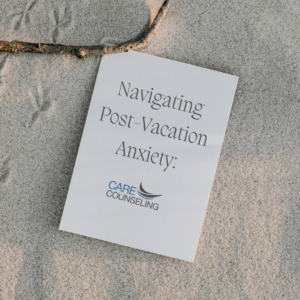Navigating Post-Vacation Anxiety
 After days of relaxation, exploration, and disconnecting from the demands of daily life, the prospect of returning to reality can evoke a mix of emotions. Post-vacation anxiety, sometimes referred to as “post-travel blues,” is a common phenomenon that many travelers experience as they transition back to their routines. The contrast between the carefree vacation mindset and the responsibilities awaiting their return can create feelings of unease and stress. Fortunately, there are strategies you can employ to navigate post-vacation anxiety and ease your reentry into daily life.
After days of relaxation, exploration, and disconnecting from the demands of daily life, the prospect of returning to reality can evoke a mix of emotions. Post-vacation anxiety, sometimes referred to as “post-travel blues,” is a common phenomenon that many travelers experience as they transition back to their routines. The contrast between the carefree vacation mindset and the responsibilities awaiting their return can create feelings of unease and stress. Fortunately, there are strategies you can employ to navigate post-vacation anxiety and ease your reentry into daily life.
Understanding Post-Vacation Anxiety
Post-vacation anxiety arises from a variety of factors, including the shift in mindset, the reacclimating to responsibilities, and the pressure to seamlessly transition from leisure to work mode. It’s important to remember that these feelings are normal and temporary. Acknowledging and addressing them can help you manage the transition more effectively.
Strategies for a Smooth Reentry
- Plan Buffer Time: Whenever possible, schedule an extra day or two between your return from vacation and your return to work or other commitments. This buffer time allows you to ease back into your routine gradually.
- Unpack Mindfully: Unpacking can be a symbolic way to transition from vacation mode to daily life. Take your time unpacking and organizing, allowing yourself to mentally process the return.
- Reflect on Memories: Set aside time to reflect on the positive moments and experiences from your vacation. Reminding yourself of the joy you experienced can help counteract negative feelings associated with reentry.
- Practice Self-Compassion: Be kind to yourself during the transition period. Avoid self-judgment for feeling anxious or overwhelmed. Remember that it’s okay to take things one step at a time.
- Create a To-Do List: Before your vacation ends, create a to-do list for your first day back. Having a plan can help you feel more in control and prepared for the tasks ahead.
- Prioritize Self-Care: Take care of your physical and emotional needs as you reacclimate. Get adequate sleep, eat nourishing foods, and engage in activities that bring you joy.
- Ease into Responsibilities: Gradually reintroduce your work and other responsibilities. Start with small tasks before tackling more demanding projects.
- Practice Mindfulness: Mindfulness techniques can help you stay present and reduce anxiety. Focus on your breath, notice your surroundings, and let go of future worries.
- Set Realistic Expectations: Don’t expect to immediately return to your pre-vacation productivity level. Give yourself time to readjust and regain your rhythm.
- Stay Connected: Maintain connections with loved ones you met during your vacation or friends and family back home. Sharing your experiences and emotions can help alleviate feelings of isolation.
- Embrace Positive Habits: Reestablish positive habits that promote your overall well-being, such as exercise, journaling, or meditation. These habits can anchor you during times of transition.
- Plan Future Getaways: Having something to look forward to can alleviate post-vacation blues. Start planning your next adventure to keep your spirits high.
Utilizing the Lessons of Travel
Traveling offers valuable insights that can be applied to your post-vacation reentry:
- Embrace Flexibility: Just as travel requires flexibility, so does the transition back to your routine. Be open to adjustments and changes as you ease back into your responsibilities.
- Cultivate Gratitude: Carry the gratitude you felt during your vacation into your daily life. Appreciate the small moments and find joy in your routines.
- Maintain Perspective: The sense of wonder and exploration you experience while traveling can be applied to your everyday life. Approach challenges with curiosity and a willingness to learn.
- Find Balance: Strive for a balance between work and leisure. Incorporate aspects of your vacation mindset, such as relaxation and exploration, into your regular routine.
Seek Support if Needed!
If your post-vacation anxiety is particularly intense or persistent, don’t hesitate to seek support. Talking to a friend, family member, or mental health professional can provide you with strategies to manage your feelings and cope with the transition.
Embrace the Transition
Navigating post-vacation anxiety requires patience, self-compassion, and a willingness to embrace the transition. Remember that the adjustment period is temporary and that you have the power to shape your mindset as you reenter daily life. By implementing these strategies and carrying the lessons of travel with you, you can transition smoothly and find a sense of balance and well-being in both your adventures and your everyday experiences.



























